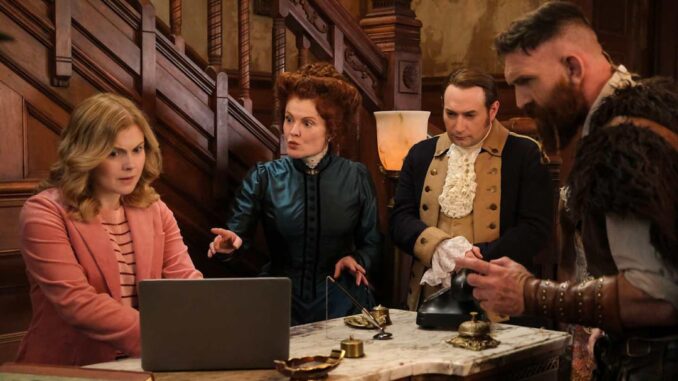
Sucked Off: A Ghostly Gasp and the Boundaries of Television Comedy
The spectral plane, as depicted in the hit show Ghosts, is a realm of polite anachronisms, quirky historical figures, and enduring, often hilarious, misunderstandings. It's a place where a Viking warrior struggles with modern plumbing, a 1980s finance bro obsesses over cryptocurrency, and a Lenape Native American observes the absurdities of colonial life with a weary sigh. Within this carefully constructed comedic ecosystem, the sudden eruption of the phrase "sucked off" from the lips of one of its ghostly inhabitants caused a palpable ripple, a moment of unexpected irreverence that, according to a recent interview, genuinely surprised the actor portraying the character. This confession illuminates not just the actor's reaction, but also the delicate dance between shock value and comedic effect in modern television, highlighting the boundaries, both real and perceived, that creators must navigate when pushing the envelope.
The initial shock, as confessed by the actor, likely stems from the show's overall tone. Ghosts thrives on gentle humor, clever writing, and the charm of its ensemble cast. It avoids gratuitous vulgarity, relying instead on character-driven comedy and situational irony. The phrase "sucked off," with its inherent explicitness, feels like a rogue element, a jarring note in an otherwise harmonious melody. It’s a reminder that even in a show about death and the afterlife, the living audience still harbors certain expectations and sensitivities. The actor’s surprise is understandable; it suggests a possible disconnect between the perceived identity of the show and the intention behind this particular comedic choice.
However, the phrase's inclusion also begs the question: why was it there in the first place? Comedy thrives on subversion, on challenging expectations and poking fun at societal norms. Perhaps the writers intended to jolt the audience, to momentarily disrupt the show's predictable gentility and inject a dose of unexpected absurdity. The phrase, depending on the context and delivery, could have been used to highlight the characters' naivete, their unfamiliarity with modern language, or simply to generate a laugh based on the unexpected juxtaposition of their historical sensibilities and contemporary slang.
The effectiveness of this comedic strategy hinges on several factors. Firstly, context is paramount. If the phrase was used gratuitously, simply for shock value without serving a larger narrative purpose, it would likely fall flat. However, if it was cleverly integrated into the dialogue, contributing to character development or highlighting a particular theme, it could be considered a successful comedic risk. For example, imagine a Puritan character, utterly unfamiliar with the phrase, misinterpreting its meaning with hilarious consequences. In that scenario, the "shock" factor becomes secondary to the comedic potential arising from the character's innocent misunderstanding.
Secondly, delivery plays a crucial role. A deadpan delivery, emphasizing the absurdity of the situation, might be funnier than an overly dramatic or salacious one. The actor's performance can either amplify the shock value or subtly transform it into a moment of genuine comedic gold. The key is to avoid crossing the line from humorous subversion into vulgarity for the sake of vulgarity.
Finally, the reaction of the audience is the ultimate litmus test. Did the phrase elicit genuine laughter, or did it generate discomfort and disapproval? Did it enhance the show's overall comedic impact, or did it detract from its carefully crafted tone? The answer to these questions will determine whether the risk paid off, or whether it proved to be a miscalculation.
The actor’s confession that he was "shocked" by the use of the phrase "sucked off" in Ghosts ultimately serves as a reminder of the ongoing evolution of television comedy. It highlights the delicate balance between pushing boundaries and maintaining audience appeal, between embracing shock value and crafting genuine, character-driven humor. It forces us to consider the role of language, context, and delivery in shaping the comedic experience, and to acknowledge the inherent subjectivity of what we find funny. Ultimately, the success of such a bold comedic choice hinges on its ability to resonate with the audience, to challenge their expectations without alienating them, and to ultimately contribute to the show's overall narrative and comedic vision. It is a gamble, but in the world of ghosts and sitcoms, sometimes a little bit of shock can go a long way.
